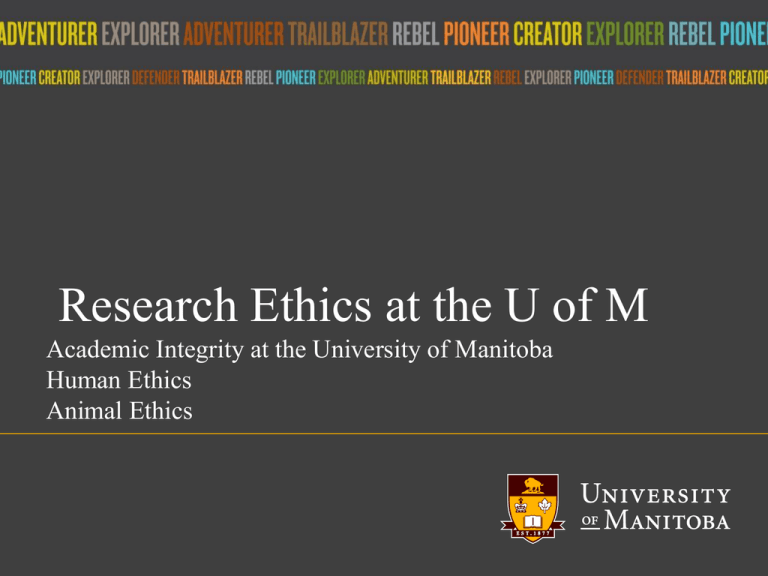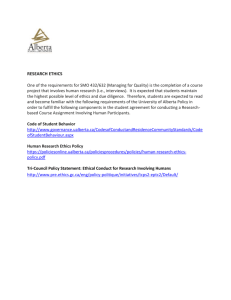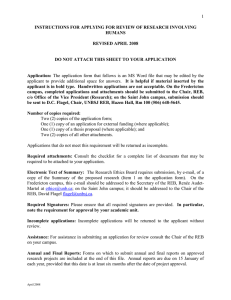Research Ethics - PPTX - University of Manitoba
advertisement

Research Ethics at the U of M Academic Integrity at the University of Manitoba Human Ethics Animal Ethics Title of presentation umanitoba.ca The Tri-Council Framework • NSERC, SSHRC and CIHR have set out a Framework for the responsible conduct of research • Nominally for those receiving public funds through these agencies but in reality, for all research • The UM signed onto this Framework, as did all Universities in Canada that wish to remain eligible for Tri-Council funding • Requires policy updates to reflect this Framework and educational efforts with Faculty and trainees in the responsible conduct of research Tri-Council Framework • All funding applications are based on accurate and reliable information • All public funds are used in a responsible manner in accordance with funding agreements • Promote and protect the quality, accuracy and reliability of all research conducted at an institution • Promote fairness in the conduct of research and in the processes for addressing allegations of policy breaches New From the Tri-Councils 1. Consent to disclosure of personal information – will allow the Tri-Councils to release the name and institution of anyone found to be in breach of research policies. 2. At the time of application, you must disclose whether you have ever been found to have breached any University of Manitoba or any other institution’s responsible conduct of research policies 3. All breaches investigated by the UM, whether substantiated or not, must be reported to the Tri-Council Ethics Secretariat. UM Policies and Procedures • The UM has three documents related to the responsible conduct of research: • 1. A Policy that articulates a Code of Research Ethics for researchers (reflecting the Tri-Council Framework) • 2. A Policy outlining the Responsible Conduct of Research at the UM • 3. Procedures for investigating policy breaches (1) Code of Research Ethics Policy • High level of rigour in conducting research • Maintain complete and accurate records of all research data, source material, methodologies and findings • Reference and, where applicable, obtain permission for, the use of all published and unpublished works • Include as authors all those who materially or conceptually contributed to and share responsibility for, the contents of the document, presentation, report or other material arising from the research (1) Code of Research Ethics (cont’d) • Acknowledge all contributors (writers, sponsors, funders) • Appropriately manage any real, potential or perceived conflicts of interest (UM Conflict of Interest Policy) • Ensure that all those whose names appear on the application for funding and any and all publications and other documents arising from the research, have agreed to be included (2) UM Policy on the Responsible Conduct of Research • Revised and updated to harmonize with the Tri-Council Framework • Codifies the terms and definitions associated with responsible conduct of research • Allows for investigating alleged breaches • Designates the VPRIO as the “designated officer” for investigations (3) Investigation Procedures • UM policy and procedures are consistent with the Tri-Council Framework • The Designated Officer is the Vice-President (Research and International) • Protection for “whistleblowers” • Due process for the person alleged to have breached • Appeal process • Appropriate procedures for frivolous allegations • Where appropriate, sanctions by the Vice-President (Academic) and Provost • Allows for informal resolution of breaches where the breach is deemed by all parties to be of a minor nature Education/Awareness at UM • UM has purchased an on line tutorial from the Epigeum Group (UK) • Content advisor is Dr. Nicholas Steneck, University of Michigan and world-renowned expert in the ethics of research and research integrity • Available through D2L (via JUMP) • You can self-register for the course – and it is FREE – no tuition!!! On Line Tutorial • Completion requires between 5 and 8 hours – 5 is the minimum for UM Faculty and students • Has modules relevant to your discipline (natural sciences and engineering; social sciences and humanities; health research) • Can be completed at your leisure from any computer • You will get a certificate upon completion • Strongly encouraged for all graduate students, senior (Honours) undergraduate students and all faculty members. • For students, this will be included on the co-curricular record (CCR) On Line Tutorial Topics • • • • • • • • The student-supervisor relationship Ownership of data; IP Research records Plagiarism Self-plagiarism Copyright Authorship Reviewing/publication ethics (grant applications and papers/manuscripts) Human Ethics • In order to use human participants in your research, you must complete the CORE tutorial on line (Course on Research Ethics) • Submit protocols to one of 5 REBs at the UM: - Psychology/Sociology REB - Education/Nursing REB - Joint Faculty REB (if you don’t fit into one of the above) - Biomedical REB - Health Research REB Contact” Maggie Bowman (474-7122; margaret.bowman@umanitoba.ca) Animal Ethics • Complete the animal users course once every 5 years • Ft. Garry Campus and Bannatyne Campus ACCs • Contact: Tracy van Osch (474-6182; tracy_vanosch@umanitoba.ca) Title of presentation umanitoba.ca






